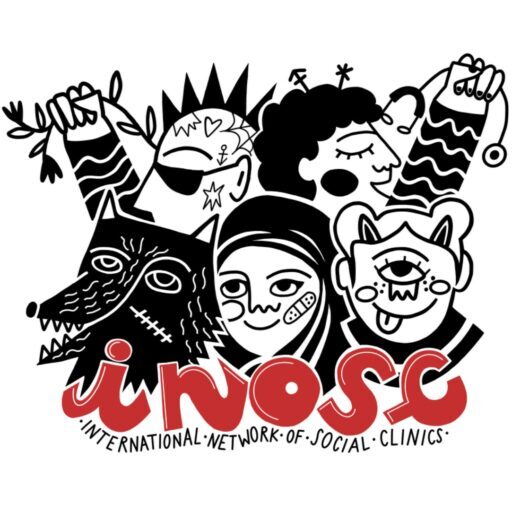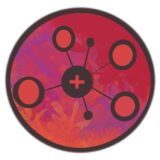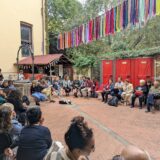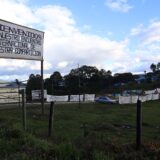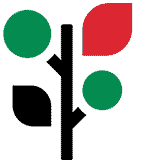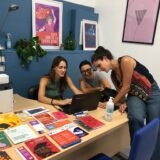section 3: Emerging medical practices
Across the Social clinics involved in our network, we can identify a range of emerging practices that are inclusive and egalitarian, fostering the creation of communities of care. These practices produce new ways of ‘knowing’ about healthcare, aligned with our organizational principles and political aspirations towards the creation of more equitable, just, and anti-authoritarian societal structures that can extend beyond the healthcare sector.
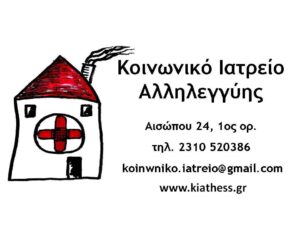 KIA
KIA
At KIA, The Other Medicine Team takes an approach that treats individuals as a physical-mental-social whole. Patients are active participants in their treatment. Rather than referring to them as “patients”, with the passive connotation that the term implies, we call them “incomers”. The”incomer”attends a joint session with the Health Team, which includes a general practitioner, a psychotherapist and a non-healthcare (non-specialist) member of the Social Clinic.
Ιnformation is gathered based on the Health Card, which covers all areas of life: education, work, occupational hazards, career path, insurance, residence, support network, family, relationships and life events based on the in-comer’s genogram. It also includes information on diet, sleep, habits, physical hygiene, oral hygiene as well as medical history, heredity and, current symptoms. A physical examination is conducted as part of this comprehensive approach, whose ultimate aim is to produce a trans-contextual understanding of the incomer, mapping their relations to the contexts of work, residence, relationships, health, etc.).
This practice connects symptoms with current wider problems, like work precarity and unemployment, to major life events like illnesses, deaths, separations, or bankruptcy. It also takes into account relationship history, such as patterns of trauma.The Health Card provides a “hologram” of the incomer, offering a preventive dimension by identifying risks related to the body (eg. heredity), relationships, and social conditions.
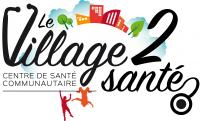 Village 2 santé
Village 2 santé
At Village 2 santé, we believe that care starts the moment you enter the clinic. All professionals-regardless of their specializations-provide care at an equal level. We aim to demedicalize the process by recognizing that doctors are not the only professionals capable of providing care.
Depending on the situation, incomers may see a variety of practitioners, including social workers, nurses, medico-social coordinators, or specialists in work rights, etc. Care is also provided through collective activities and community conviviality. We have meetings to discuss the most complex situations, ensuring the best solutions are found through collaboration.
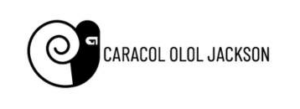 Ambulatorio Popolare Caracol Olol Jackson
Ambulatorio Popolare Caracol Olol Jackson
Our attitude towards the incomers who arrive at our clinic goes well beyond the mere medical relation. We take care of the clinic space: we want the place to be beautiful and uplifting in order to restore dignity and self-respect to whoever enters and operates here. Our care focuses on the overall well-being of our incomers, not just their symptoms response, care, information, or referral to other services.
– Direct access even without an appointment and then programming.
– Focus on communication, which can be professional and empathic formal and respectful but also friendly and informal. ‘We believe that communication time is a time of care”.
– Devote the necessary time to both listening and caring.
– Offer specialized services that are not provided by public healthcare: pain therapy and acupuncture; psychological and psycho-therapeutic support; primary and prosthetic dental
care; financial assistance for prosthetic treatment, low costs, and installment payments.
– Organization of health education meetings on the development and care of personal health. – Psycho-social support in navigating everyday life needs, orientation towards public services,
and mediation with other specialists.
– Create cultural, artistic, and musical spaces that weave together broader aspects of health.
– Dealing with gender issues in broad forms, ranging from artistic expression to face-to-face exchanges.
– Taking care of the environment and the territory by promoting meetings and mobilizations.
Health is an individual and collective good. It revolves around a network of balances whose threads depend on the economy, our relationships, information, education, and above all by a community that takes care of itself.
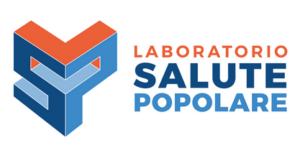 Laboratorio di Salute Popolare
Laboratorio di Salute Popolare
The Social Clinic “Laboratorio di Salute Popolare”(Bologna, Italy) was established in 2019 by students and care professionals as a space for inter-professional analysis and reflection.
It is part of a broader political space that strives to provide employment support, legal aid and document requests and language tuition, as well as to promote community, cultural, and political advocacy actions in Bologna. For us, care is a multidimensional process that takes place through community involvement. Our efforts address both urgent needs and long term community development, which serves as a preventive tool.
The weekly assembly of LSP has produced four different services over the years: a medical outpatient clinic, which deals with general health, identification of needs and orientation to the national health system, a psychological support desk, a dental clinic and a gynecological clinic. Each service is run by specialized professionals, but care is coordinated by a multi-professional team and discussed in the assembly. In addition, clinical activity is complemented, whenever possible, by educational activities, usually public. These constitute dedicated spaces for reflection where people are freed from the hierarchical relationship between health service providers and service users, allowing for an equal exchange of health needs and collective construction of new spaces for action.
In each clinic, we use “social triage” to identify the most critical social determinants of health for each incomer, beyond their expressed medical needs. This approach allows us to refer
incomers to other services within the center (employment assistance, legal desk, Italian school) or to other services in town. Everyone is welcome, regardless of their social or legal status. We help those eligible to register with the national health system and for those without legal documents, we collaborate with the legal aid activists of our center or with other services to find alternative solutions.
